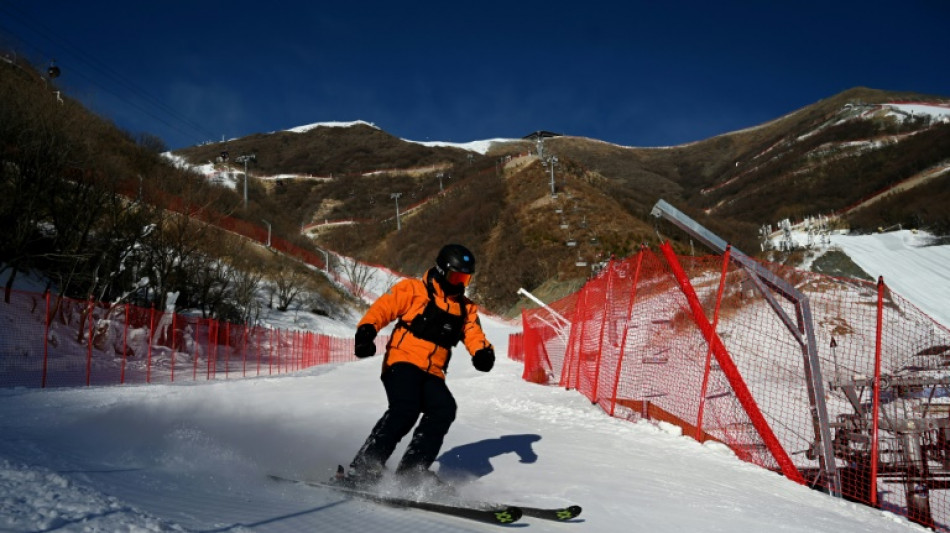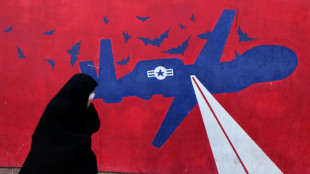
-
 Vonn to provide injury update as Milan-Cortina Olympics near
Vonn to provide injury update as Milan-Cortina Olympics near
-
France summons Musk for 'voluntary interview', raids X offices

-
 Stocks mostly climb as gold recovers
Stocks mostly climb as gold recovers
-
US judge to hear request for 'immediate takedown' of Epstein files

-
 Russia resumes large-scale strikes on Ukraine in glacial temperatures
Russia resumes large-scale strikes on Ukraine in glacial temperatures
-
Fit-again France captain Dupont partners Jalibert against Ireland

-
 French summons Musk for 'voluntary interview' as authorities raid X offices
French summons Musk for 'voluntary interview' as authorities raid X offices
-
IOC chief Coventry calls for focus on sport, not politics

-
 McNeil's partner hits out at 'brutal' football industry after Palace move collapses
McNeil's partner hits out at 'brutal' football industry after Palace move collapses
-
Proud moment as Prendergast brothers picked to start for Ireland

-
 Germany has highest share of older workers in EU
Germany has highest share of older workers in EU
-
Teen swims four hours to save family lost at sea off Australia

-
 Ethiopia denies Trump claim mega-dam was financed by US
Ethiopia denies Trump claim mega-dam was financed by US
-
Norway crown princess's son pleads not guilty to rapes as trial opens

-
 Russia resumes strikes on freezing Ukrainian capital ahead of talks
Russia resumes strikes on freezing Ukrainian capital ahead of talks
-
Malaysian court acquits French man on drug charges

-
 Switch 2 sales boost Nintendo profits, but chip shortage looms
Switch 2 sales boost Nintendo profits, but chip shortage looms
-
China to ban hidden car door handles, setting new safety standards

-
 Switch 2 sales boost Nintendo results but chip shortage looms
Switch 2 sales boost Nintendo results but chip shortage looms
-
From rations to G20's doorstep: Poland savours economic 'miracle'

-
 Russia resumes strikes on freezing Ukrainian capital
Russia resumes strikes on freezing Ukrainian capital
-
'Way too far': Latino Trump voters shocked by Minneapolis crackdown

-
 England and Brook seek redemption at T20 World Cup
England and Brook seek redemption at T20 World Cup
-
Coach Gambhir under pressure as India aim for back-to-back T20 triumphs

-
 'Helmets off': NFL stars open up as Super Bowl circus begins
'Helmets off': NFL stars open up as Super Bowl circus begins
-
Japan coach Jones says 'fair' World Cup schedule helps small teams

-
 Equities and precious metals rebound after Asia-wide rout
Equities and precious metals rebound after Asia-wide rout
-
Do not write Ireland off as a rugby force, says ex-prop Ross

-
 Winter Olympics 2026: AFP guide to Alpine Skiing races
Winter Olympics 2026: AFP guide to Alpine Skiing races
-
Winter Olympics to showcase Italian venues and global tensions

-
 Buoyant England eager to end Franco-Irish grip on Six Nations
Buoyant England eager to end Franco-Irish grip on Six Nations
-
China to ban hidden car door handles in industry shift

-
 Sengun leads Rockets past Pacers, Ball leads Hornets fightback
Sengun leads Rockets past Pacers, Ball leads Hornets fightback
-
Waymo raises $16 bn to fuel global robotaxi expansion

-
 Netflix to livestream BTS comeback concert in K-pop mega event
Netflix to livestream BTS comeback concert in K-pop mega event
-
Rural India powers global AI models

-
 US House to vote Tuesday to end shutdown
US House to vote Tuesday to end shutdown
-
Equities, metals, oil rebound after Asia-wide rout

-
 Bencic, Svitolina make history as mothers inside tennis top 10
Bencic, Svitolina make history as mothers inside tennis top 10
-
Italy's spread-out Olympics face transport challenge

-
 Son of Norway crown princess stands trial for multiple rapes
Son of Norway crown princess stands trial for multiple rapes
-
Side hustle: Part-time refs take charge of Super Bowl

-
 Paying for a selfie: Rome starts charging for Trevi Fountain
Paying for a selfie: Rome starts charging for Trevi Fountain
-
Faced with Trump, Pope Leo opts for indirect diplomacy

-
 NFL chief expects Bad Bunny to unite Super Bowl audience
NFL chief expects Bad Bunny to unite Super Bowl audience
-
Australia's Hazlewood to miss start of T20 World Cup

-
 Bill, Hillary Clinton to testify in US House Epstein probe
Bill, Hillary Clinton to testify in US House Epstein probe
-
Cuba confirms 'communications' with US, but says no negotiations yet

-
 Iran orders talks with US as Trump warns of 'bad things' if no deal reached
Iran orders talks with US as Trump warns of 'bad things' if no deal reached
-
From 'watch his ass' to White House talks for Trump and Petro


Chinese trauma doctors perfect ski skills for Olympics
Undeterred by the heavy medical bags on their backs, a group of Chinese doctors zipped down a steep ski slope, part of a crack medical team tasked with racing to any injured athletes during the Winter Olympics.
Dressed in bright orange jackets with white crosses, the medics are the first group of people in China to be specifically trained for emergency ski rescues.
And until recently, most were little more than amateur skiers in a country with a nascent winter sports scene.
"The training was not easy," recalled Li Qiyi, a 49-year-old orthopaedic surgeon usually stationed at Xiehe Hospital, one of Beijing's top medical facilities.
"It sometimes dropped to -20 or -30 degrees, with an even lower windchill factor. Some of us had frostbite on our feet or face," he told AFP.
The world's finest skiers will start competing in the slalom, downhill and Super-G competitions in early February.
Li was among a group of medics AFP interviewed who were putting in last minute practice at Yanqing, one of two sites north of China's capital that will host mountain-based events.
The doctors are expected to get to any athlete who needs them within four minutes of an accident.
If someone suffers a catastrophic injury, those first few minutes can be vital for saving a life.
- Extreme cold -
Back in 2018, authorities put a call out to a dozen regional hospitals looking for volunteer doctors for the Games.
There was one key demand: those applying needed to have at least some experience of skiing.
Ahead of the Olympics, the government has been keen to promote winter sports, with mass construction of snow resorts leading to millions of fresh devotees.
But finding world class medical professionals who could handle themselves on all slopes in all conditions was no easy task.
Li Qiujun, a 39-year-old anaesthesiologist at Beijing's Jishuitan Hospital, jumped at the opportunity to volunteer as he considered himself an accomplished skier.
"I was going down black slopes, so I thought I was good, but when the training started, I realised that I was still far from the required level," he said smiling.
"We are all doctors, so we are used to doing emergency rescues in our hospitals. But on a competitive ski track, with the extreme cold, the slope, the environment, it's very different."
The three doctors AFP spoke to all had the family name Li but were unrelated.
Li Dong, a 51-year-old doctor from the Changping traditional Chinese medicine hospital, said the learning curve was a steep one.
"Learning to put on and take off the skis on the snow, it was difficult," she recalled.
"If you fall, you would tumble all the way down because the track is super steep and slippery."
Overall the team of more than 40 doctors has trained some four to five weeks a year over the last four years to get to where they now are.
They were taught multiple advanced techniques, such as how to safely descend steep edges on the sides of their skis and use crampons for icy sections.
- 'Proud to be a part' -
Much like military medics, the main focus is on speed.
"If a skier gets hurt, we have to be able to get to him in four minutes," said Li Qiyi.
"We must assess the severity of the injury and then perform first aid so that he can be evacuated quickly to a place where he can receive better care."
While some athletes have been killed preparing for the Winter Olympics or during a training session, no one has yet died during competition at the Games.
But the dangers are clear to anyone who takes part in, or watches, winter sports.
Downhill skiers can travel up to 140 kilometres per hour (87 miles per hour) and spectacular wipeouts do happen.
"We stand by for orders at the most dangerous parts of the competition track, and prepare for when an emergency happens," explained Li Qiujun.
The skiing doctors are equipped with 5G walkie-talkies as well as medical rucksacks filled with trauma essentials, including intubation equipment, tourniquets, splints, syringes, oxygen and defibrillators.
They must also be able to communicate with foreign athletes.
"If the injured remains conscious, we communicate with them in English. We had a lot of English lessons during our training," explained Li Qiyi.
Li Dong recalled her elderly parents were initially concerned about her training to be a ski doctor.
"At the beginning, they said 'Don’t go, it's very dangerous' but after they saw that I was full of emotions, they became very supportive," she recalled.
"We are proud to be a part of it."
X.Habash--SF-PST



